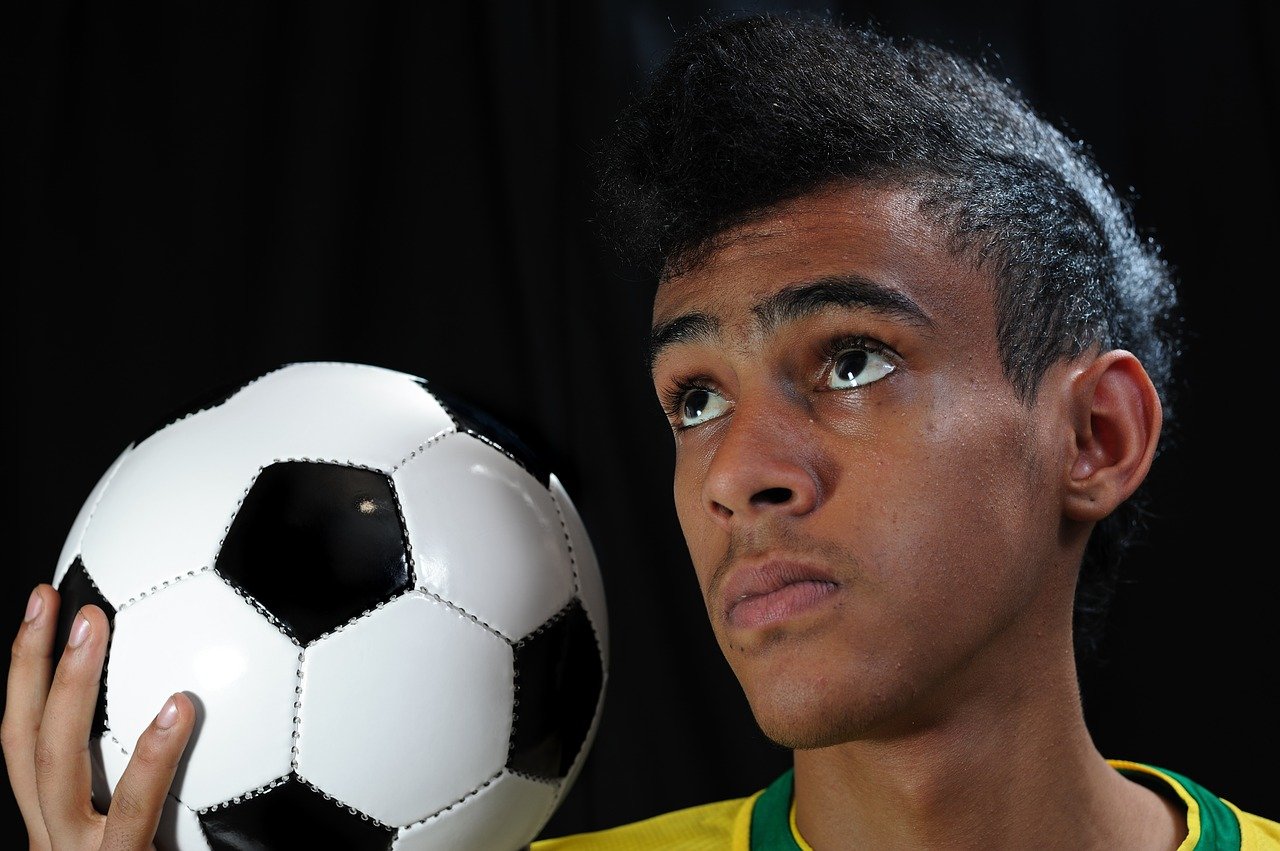Image by FOTOKALDE from Pixabay
In this blog post we’ll look at vocabulary and expressions that you can use to describe people in Portuguese.
Este é meu amigo/ minha amiga. This is my friend.
Let’s start with phrases you can use to introduce people and say how you know each other.
- Este é meu amigo. / Esta é minha amiga.
This is my friend. - (Nós) Trabalhamos juntos /as.
We work together. - (Nós) Costumávamos trabalhar juntos /as.
We used to work together.
- Estamos na mesma escola.
We go to school together. - Estávamos na mesma escola.
We went to school together. - Onde vocês se conheceram?
Where did you meet each other? - Nos conhecemos na universidade / em uma festa / em um bar / em um café.
We met at university/at a party/at a bar/at a coffee shop. - Temos amigos/ as em comum.
We have mutual friends. - Nos conhecemos há muitos anos.
We’ve known each other for years. - Crescemos juntos / as.
We grew up together. - Somos vizinhos / as.
We’re neighbors.
Ele é alto. He’s tall.
If you’re telling someone about a friend, you may want to describe him or her. Let’s start with physical characteristics.
- Como ele / ela é fisicamente?
What does he/she look like? - Ele é alto. / Ela é alta.
He’s/She’s tall. - Ele é baixo. Ela é baixa.
He’s/She’s short. - Ele / Ela é atraente.
He’s/She’s good looking. - Ele é magro. Ela é magra.
He’s/She’s thin. - Ele é gordo. / Ela é gorda.
He’s/She’s fat. - Ele / Ela é jovem.
He’s/She’s young. - Ele é velho. Ela é velha.
He’s/She’s old. - Ele / Ela está em forma.
He’s/She’s in shape. He’s in shape. - Ele / Ela está fora de forma.
He’s/She’s out of shape.
Ela tem cabelos compridos. She has long hair.
People have all sorts of different estilos de cabelo hairstyles, so that’s a common way to describe people.
- Ele / Ela tem cabelos curtos.
He/She has short hair. - Ele / Ela tem cabelos compridos.
He/She has long hair. - Ele / Ela tem cabelos lisos.
He/She has straight hair. - Ele / Ela tem cabelos encaracolados.
He/She has curly hair. - Ele / Ela tem cabelos loiros / pretos.
He/She has blond hair/black hair. - Ele / Ela tem cabelos ruivos / castanhos / grisalhos.
He/She has red hair/brown hair/gray hair. - Ela usa tranças.
She has braids. - Ele é careca.
He’s bald. - Ele tem um bigode / uma barba.
He has a mustache/beard.
Personalidades Personalities
Sometimes we describe people we know by talking about their personality types.
- Como é a personalidade dele / dela?
What kind of personality does he/she have? - Ele é tímido. / Ela é tímida.
He’s/She’s shy. - Ele é extrovertido. Ela é extrovertida.
He’s/She’s outgoing. - Ele é sério. Ela é séria.
He’s/She’s serious. - Ele é ansioso. Ela é ansiosa.
He’s/She’s anxious. - Ele é calmo / tranquilo. Ela é calma / tranquila.
He’s/She’s relaxed/easy-going. - Ele / Ela é uma pessoa feliz.
He’s/She’s a happy person. - Ele / Ela é uma pessoa infeliz.
He’s/She’s an unhappy person. - Ele é muito bem organizado. Ela é muito bem organizada.
He’s/She’s very organized. - Ele / Ela é otimista.
He’s/She’s an optimist. - Ele / Ela é pessimista.
He’s/She’s a pessimist.
Eu gosto dela! I like her!
If you like someone, traços de personalidade positivos positive personality traits are probably something you would use to describe them.
- Ele / Ela tem uma ótima personalidade .
He/She has a great personality. - Gosto muito dela.
I like her a lot. - Gosto muito dele.
I like him a lot. - Ele é um ótimo amigo. Ela é uma ótima amiga.
He/She is a good friend. - Ele / Ela é muito interessante.
He’s/She’s very interesting. - Ele / Ela é muito alegre.
He’s/She’s very cheerful. - Ele / Ela está sempre de bom humor.
He’s/She’s always in a good mood. - Ele é muito simpático/ legal. Ela é muito simpática / legal.
He’s/She’s very friendly/nice. - Ele é um amigo fiel./ Ela é uma amiga fiel.
He’s/She’s a loyal friend. - Ele é muito atencioso. Ela é muito atenciosa.
He’s/She’s thoughtful of others. - Ele é muito compreensivo. Ela é muito compreensiva.
He’s/She’s open-minded. - Ele é modesto. Ela é modesta.
He’s/She’s modest. - Ele / Ela se dá bem com todo mundo.
He/She gets along with everyone.
Eu não gosto dele! I don’t like him!
On the other hand, if you don’t like someone, traços de personalidade negativos negative personality traits are what you’d use to describe them.
- Eu não gosto dele. Eu não gosto dela.
I don’t like him. I don’t like her. - Ele / Ela me irrita / me dá nos nervos.
He/She annoys me/gets on my nerves. - Ele / Ela está sempre de mau humor.
He’s/She’s always in a bad mood. - Ele é malvado / antipático. Ela é malvada / antipática.
He’s/She’s mean/unfriendly. - Ele é teimoso. Ela é teimosa.
He’s/She’s stubborn. - Ele / Ela é intransigente.
He’s/She’s closed-minded. - Ele é maçante / chato. Ela é maçante / chata.
He’s/She’s dull/boring. - Ele / Ela é egoísta.
He’s/She’s selfish. - Ele / Ela é arrogante.
He’s/She’s arrogant. - Ele / Ela não é confiável.
He’s/She’s not trustworthy. - Ele é indiferente.
He’s inconsiderate. - Ele é um idiota. / Ela é uma idiota.
He’s/She’s a jerk!
Ele sempre sorri. He always smiles.
We often describe people by talking about their hábitos habits.
- Ela vive sorrindo. Ela nunca sorri.
She smiles all the time. She never smiles. - Ele vive rindo. Ele nunca ri.
He laughs all the time. He never laughs. - Ela trabalha muito.
She works very hard. - Ele é preguiçoso.
He’s lazy. - Ela reclama muito.
She complains a lot. - Ela nunca reclama.
She never complains. - Ele nunca quer fazer nada divertido.
He never wants to do anything fun. - Ela sempre quer fazer algo animado.
She always wants to do something exciting. - Ela malha muito.
She works out a lot. - Ele joga videogames demais.
He plays too many video games. - Ele sempre obedece às regras.
He always follows the rules. - Ela faz aquilo que dá na cabeça.
She does whatever she wants. - Ela vive saindo com os /as amigos/ as.
She goes out with her friends a lot. - Ele gosta de ficar em casa.
He likes to stay home. - Ela pratica muitos esportes.
She plays a lot of sports. - Ele vive lendo.
He reads all the time. - Ele dá festas ótimas.
He throws great parties. - Ela ajuda muito os/ as amigos/as.
She does a lot for her friends.
Ela é muito sabida. She’s really smart.
People have different talentos talents and interesses interests, and sometimes we describe people by saying what they’re good (or not so good!) at.
- Ele é muito sabido/ inteligente. / Ela é muito sabida / inteligente.
He’s/She’s smart/intelligent. - Ele / Ela curte história / línguas / arte / cinema.
He’s/She’s interested in history/languages/art/movies. - Ele / Ela escreve / cozinha / pinta / canta muito bem.
He/She writes/cooks/paints/sings very well. - Ele / Ela tem muitos passatempos.
He/She has a lot of hobbies. - Ele / Ela ama animais.
He/She loves animals. - Ele / Ela ama viajar.
He/She loves to travel. - Ele / Ela ama passar tempo com os/ as amigos/as.
He/She loves to spend time with friends. - Ele é um bom jogador de tênis. / Ela é uma boa jogadora de tênis.
He’s/She’s good at tennis. - Ele é um péssimo jogador de tênis. / Ela é uma péssima jogadora de tênis.
He’s/She’s terrible at tennis. - Ele / Ela tem um grande talento musical.
He’s/She’s gifted musician. - Ele / Ela não consegue dançar / cantar bem.
He/She can’t sing/dance well. - Ele / Ela é muito criativo/a .
He’s/She’s very creative. - Ele / Ela não é muito criativo/ a.
He’s/She’s not very creative. - Gostaria muito dele/ dela.
You would really like him/her!
Do you want to learn Portuguese?
Check out our other posts on Portuguese language, Brazilian culture, and more. And if you’re looking for convenient and affordable live Portuguese lessons with a real teacher, check out The Language Garage Portuguese. Our lessons are given online in a virtual classroom, so it doesn’t matter where you live or work. We can come to you. And we have flexible options, with a free trial so that you can decide if there’s a fit. Check us out!






